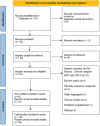Effects of high intensity interval training and moderate intensity continuous training on enjoyment and affective responses in overweight or obese people: a meta-analysis
- PMID: 39678233
- PMCID: PMC11638049
- DOI: 10.3389/fpubh.2024.1487789
Effects of high intensity interval training and moderate intensity continuous training on enjoyment and affective responses in overweight or obese people: a meta-analysis
Abstract
Background: High-intensity interval training (HIIT) and moderate-intensity continuous training (MICT) have demonstrated significant potential for enhancing physical and mental health. However, their respective effects on enjoyment and affective responses remain contentious.
Objective: The objective of this meta-analysis is to evaluate and compare the effectiveness of HIIT and MICT on enjoyment and affective responses in overweight or obese people, and to find the most appropriate exercise mode for overweight or obese people.
Materials and methods: This study was conducted following PRISMA guidelines and the Cochrane Handbook for Systematic Reviews of Interventions. A comprehensive search was performed across databases including Cochrane, EMBASE, PubMed, and Web of Science, with a cutoff date of August 2024. Data extraction and organization were carried out using Excel, and Review manager was used to evaluate the quality of the literature and to analyze and process the data. The Stata was used to test publication bias.
Results: A total of 16 articles were included in the literature, and a total of 537 participants met the inclusion criteria, including 213 participants in HIIT, 183 participants in MICT, 84 participants in alternating HIIT and MICT, and 57 participants in other forms of intervention (self-selected intensity exercise, very-high-intensity interval exercise, repetitive sprint training, and blank control). All study participants were between the ages of 18-70 years old, and the duration of the intervention ranged from 1 to 16 weeks. Enjoyment and affective effects of HIIT and MICT were analyzed using the Physical Activity Enjoyment Scale, Feeling Scale and Felt Arousal Scale.
Conclusion: Both HIIT and MICT can bring about similar enjoyable and positive affective responses in overweight and obese people, HIIT caused participants to experience higher enjoyment and similar affect responses compared to MICT.
Keywords: affect; enjoyment; high intensity interval training; moderate intensity continuous training; obese; overweight.
Copyright © 2024 Luo, Zhang, Jia, Mu and Huang.
Conflict of interest statement
The authors declare that the research was conducted in the absence of any commercial or financial relationships that could be construed as a potential conflict of interest.
Figures








References
-
- World Health Organization . (2024). Obesity and overweight. Available at: . (https://www.who.int/news-room/fact-sheets/detail/obesity-and-overweight).
-
- World Obesity Federation. World Obesity Atlas (2024) No area of the world is unaffected by the consequences of obesity. Available at: . (https://www.worldobesity.org/news/world-obesity-atlas-2024)
-
- Musa AM, Cortese S, Bloodworth O. The association between obesity and depression in adults: a meta-review. BJPsych Open. (2021) 7:S267. doi: 10.1192/bjo.2021.712 - DOI
Publication types
MeSH terms
LinkOut - more resources
Full Text Sources
Medical
Miscellaneous

